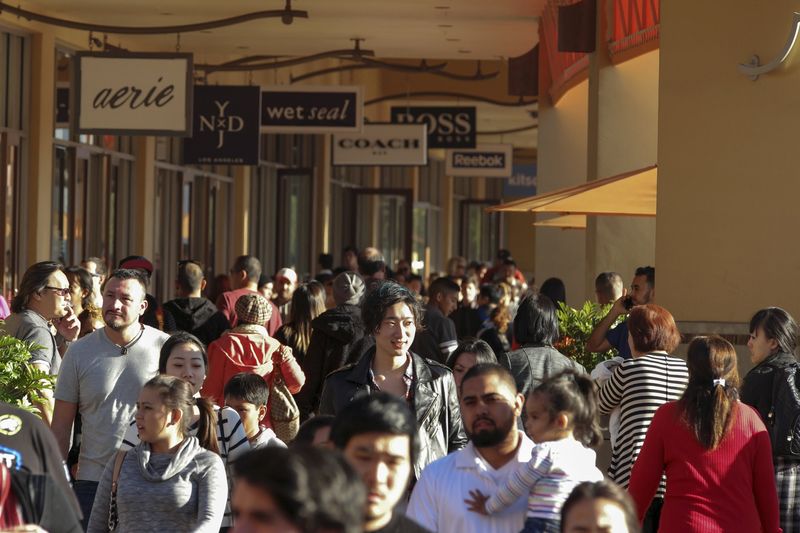By Lucia Mutikani
WASHINGTON (Reuters) - U.S. consumer spending recorded its biggest decline since late 2009 in December with households saving the extra cash from cheaper gasoline.
Other data on Monday showed factory activity cooled in January, suggesting the economy may have entered the new year on a slightly softer footing than had been expected.
Nevertheless, upbeat and cash-flush consumers are expected to step-up spending and buoy the economy this year.
"The consumer is poised to do well in early 2015. Lower gasoline prices are going to provide a big lift to consumption," said Ryan Sweet, a senior economist at Moody's Analytics in West Chester, Pennsylvania.
The Commerce Department said consumer spending, which accounts for more than two-thirds of U.S. economic activity, fell 0.3 percent after gaining 0.5 percent in November and 0.3 percent in October.
The drop, the largest since September 2009, reflected a decline in spending at service stations as gasoline prices fell, as well as weak auto receipts and weather-related softness in demand for utilities.
The spending data was included in Friday's fourth-quarter gross domestic product report, which showed the economy growing at a 2.6 percent annual pace, with consumer spending rising at a brisk 4.3 percent rate - the fastest since 2006.
Economists said fourth-quarter GDP growth is likely to be revised up to at least a 2.8 percent rate after another Commerce Department report on Tuesday showed stronger nonresidential construction spending in December than previously assumed.
Despite ending 2014 on a weak note, lower gasoline prices - which have dropped 43 percent since June - and a firming labor market are seen providing a huge tailwind to consumer spending in the first quarter.
Consumer spending estimates for the first quarter are currently ranging between a 4 percent to 5 percent rate.
In a separate report the Institute for Supply Management said its national factory activity index fell to 53.5 last month from 55.1 in December.
A reading above 50 indicates expansion in the manufacturing sector and the drop reflected a fall in export orders, as well as order backlogs, which could be related to slowing growth overseas and weak demand for energy industry-related equipment.
Business spending on equipment in the fourth quarter was the weakest since mid-2009.
Still, 14 of 18 industries reported a pick-up in activity last month, up from 11 in the prior month.
Another report from financial data firm Markit showed its U.S. Manufacturing Purchasing Managers Index was at 53.9 in January, the same as in December.
STILL HOPEFUL
"There is hope that the manufacturing sector recovery is not falling out of bed entirely," said Millan Mulraine, deputy chief economist at TD Securities in New York.
U.S. stocks were trading slightly higher, while the dollar weakened against a basket of currencies. U.S. Treasury debt prices fell.
In another good omen for consumer spending, income at the disposal of households after inflation recorded its largest gain since last March, while the saving rate hit a five-month high.
With gasoline prices trending lower, key inflation gauges slipped further below the Federal Reserve's 2 percent target in December. A price index for consumer spending fell 0.2 percent for a second month.
In the 12 months through December, the personal consumption expenditures (PCE) price index rose 0.7 percent, the weakest reading since October 2009, slowing from a 1.2 percent increase in November.
Excluding food and energy, prices were unchanged for a second straight month. The so-called core PCE price index increased 1.3 percent in the 12 months through December, the smallest gain since March.
The Fed has repeatedly said it viewed the oil-driven decline in inflation as transitory and expected inflation to move back to its target.
"The concern is that falling oil prices combined with a strong dollar, which pushes down the price of imports, could move inflation even lower, which could dampen overall economic activity," said Diane Swonk, chief economist at Mesirow Financial in Chicago.

"Outright deflation seems unlikely, especially in light of better labor market conditions."